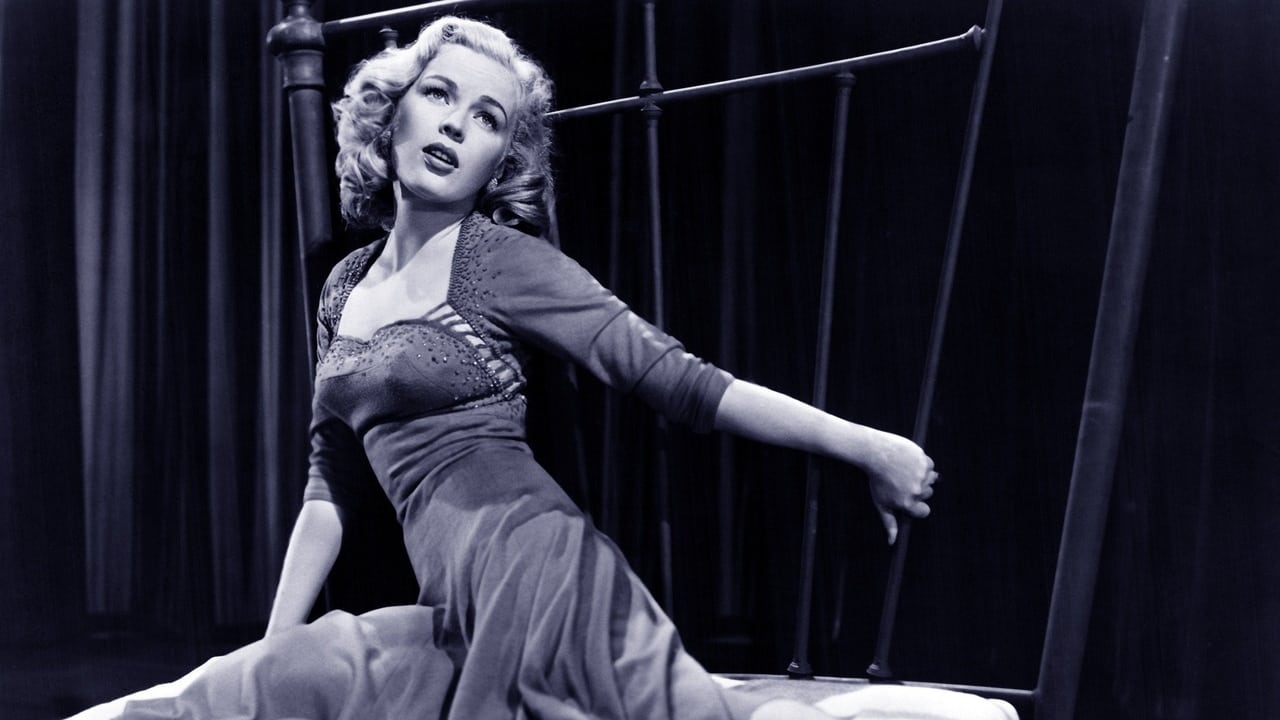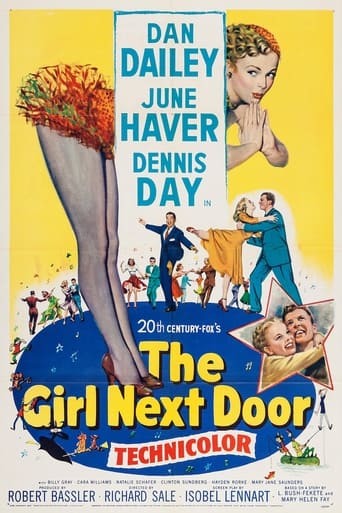

I am an odd person in that I like musicals BUT dislike them when they have a lot of songs or unnecessary song and dance sequences that slow down the plots. So, while I really loved the plot from "The Girl Next Door", I felt that a couple times the song and dance routines got in the way--particularly the fantasy sequences. Now this is NOT to say I disliked the film. I think it's actually highly underrated and don't exactly know why it isn't thought of as one of the better musicals. Perhaps it's because it starred Dan Dailey and June Haver--and they were not see as in the same level as Fred Astaire, Gene Kelly, Judy Garland and other top Hollywood names. Well, despite this, it is a very good picture...even with a song or two too many.The film begins by showing us very quickly the life of the actress Jeannie Laird (Haver). Now, after wowing audiences all over the world, she has just bought a home and plans to settle down a little bit. She's still a working woman and loves acting, but now she has a house to call her own. But, on the night she's throwing a big housewarming party, she runs afoul of her neighbors--Bill and Joe Carter (Dan Dailey and Billy Gray). Fortunately, this minor tiff did not characterize the movie or their relationship and soon she and Bill are dating. The problem is that Joe LOVES all the attention he gets from his single dad--and he naturally resents anyone who might try to take him away from him. Unfortunately, Bill is a bit oblivious to this and it takes patience from Jeannie and some understanding from Joe to work through all this.This is a very nice family film. The relationship between father and son seemed natural and sweet. Daily and Haver are exceptional, but the real star to me was Gray. While he'd played precocious and ill-behaved brats in a few previous films, here he was all boy--and I mean that in the best possible way. He seemed very natural and was in his element in the film. Overall, apart from one or two songs too many, the film has a nice story, excellent acting and is well worth your time.By the way, this was Haver's last film, as she soon retired to be a nun. This didn't take, apparently, and a bit later she became Mrs. Fred MacMurray and never looked back at her film career. Also, get a load of the big kiss at the end--it's one of the best of the era!If you see this on DVD, look for the special features--they are excellent!
... View More1953 Hollywood-MGM had "Small Town Girl"; Warner Brothers had "Three Sailors and a Girl", and Paramount announced "Here Come the Girls". 20th Century Fox added its own girl to the group by putting a girl next door. Here, June Haver plays a Broadway star who moves next door to a handsome widower (Dan Dailey) with a young son (Billy Gray) who enjoys keeping his father busy with fishing trips and things that guys do, no females allowed. When Haver has a dinner party, they ruin it, first with pet pigeons that literally get into people's hair, then with a cook-out that threatens to be a smoke-out. Haver storms over to complain but finds herself entranced by Dailey, which upsets young Gray. They had earlier shared a duet entitled "I'd Rather Have a Pal than a Gal", and now papa Dailey is tempted to switch the two nouns in the song.Haver soon finds out that writer Dailey is quite a song and dance man himself, sharing a number with helium voiced Dennis Day that ends with the usual pose of the performers having their hands out to the audience begging for applause. But Gray won't back down on trying to keep Haver and Dailey apart, having a cute little animated dream that while fishing with his father (and a talking pooch and raccoon), Haver shows up as a witch, threatening to spoil their fun. You know in the end he'll change his mind and help reconcile the two; It's just a matter of getting through a few so-so musical numbers where the songs aren't very good, but the colorful Fox direction helps distract the viewer to that fact. The choreography by Richard Barstow (whom I had never heard of until I saw his name in the credits for this film) is also covered with lavish art direction, particularly in Dailey's dream finale that has Gray using a giant pencil in his efforts to keep Haver and Dailey apart.Minus Betty Grable for the first of a few times during his Fox musical career, Dailey is likable, and more down to earth than he was in backstage musicals such as "Mother Wore Tights" (where he plays a total ham) and "When My Baby Smiles at Me" (receiving an Oscar nomination as an alcoholic). He would be paired with Jeanne Crain and Ethel Merman in other movie musicals, but here, it is blonde June Haver who gets him. Some people confuse her with the similarly named June Havoc (Baby June of "Gypsy" fame), but they are very different people. The June Haver musicals, with titles such as "The Daughter of Rosie O'Grady" and "Look For the Silver Lining", are enjoyable but not among the top rated musical films of the golden age. She had a pleasant personality, was a talented singer and dancer, passable actress, but lacked the spark of other blonde musical stars of that era such as Betty Grable, Betty Hutton, and Doris Day. It's perhaps because there's no seemingly temperament there; She's like the chorus girl who made good and never forgot from where she came. There's no scandal or temperament to her personality that make her front page news. Day could get away with her spunky sweet nature because you knew somewhere underneath laid sadness from unspoken traumas; Grable could swear and spar with the crew, yet you knew she was one of the gang who enjoyed having fun. The lack of these qualities, plus the mystery of the newest rising blonde bombshell (Marilyn Monroe), makes Haver equally talented if not remarkable in these films. Those qualities ruined her best chance for stardom as the real-life temperamental Marilyn Miller in "Look For the Silver Lining".Young Billy Gray, who was fun as the younger brother in the Doris Day/Gordon MacRae films "On Moonlight Bay" and "By the Light of the Silvery Moon", is thankfully not obnoxious as the determined kid. It's easy to understand his desire to keep his dad to himself, so he avoids being a stereotypical screen brat. It was tempting to fast forward through any moment where Dennis Day sang, but I avoided it just to make sure I didn't miss any of his love interest Cara Williams' funny wisecracks. (Her appearance with the pigeons all over her is quite humorous.) They really are a mismatched second couple and are no threat to the same years young lovers Tommy Rall and Ann Miller in "Kiss Me Kate". Natalie Schaefer, the matronly Lovey Howell of "Gilligan's Island", plays of all things, a maid, paired with Clinton Sundberg's Franklin Pangborn-ish butler. Schaefer had better screen work playing society matrons in several Joan Crawford and Lana Turner films, as well as a memorable cameo in the film version of William Saroyan's "The Time of Your Life"."The Girl Next Door" is not a hard film to like, but it is one of those musicals that had good ideas, high ambitions, but unfortunately doesn't quite come together. Try not to laugh out loud at the silliness of the final musical number which is pretty to look at, yet worthy of gapes similar to the ones of the audience to "Springtime For Hitler" in "The Producers".
... View MoreEntertaining Dan Dailey and June Haver film. It's the story of a boy affected by his widower father's attachment to the woman who has moved next door.The singing, dancing and cartoon like sequence scenes are an absolute joy to watch.Dennis Day is wonderful here in a supporting role along with a very young looking Cara Williams.The story moves along at a rapid pace and is well done with the music adding so much to the story.Look for a stodgy Clifford Sunberg as a butler.
... View MoreThe Girl Next Door is a surprising and fascinating film, partly for what it delivers, and partly because of what it indicates the future could have been for its star. The film opened quickly, and disappeared just as quickly, in New York, because its start June Haver had already entered a convent (she, of course, didn't stay there long). Not expected to be box office, the film, though, has some extraordinary moments, and the most surprising element of all is the work of June Haver. Although her voice is dubbed, her dancing is a complete revelation. Her work with Dan Dailey is superlative and shows maturity that she had never shown before. Indeed, her torch song indicates a Haver never seen before...and never to reappear. The cartoon networking is fun, and the dish number between Dailey and Billy Gray is a joyous scene. Haver also displays a wide range of emotions that indicate she had matured as an actress and was no longer the perennial ingenue. Even her figure is more eye-watchable than in previous vehicles -- including The Dolly Sisters. The film sags badly whenever Dennis Day is at hand, and even more sadly because he sings the one number that had a brief bit of fame - If I Love You a Mountain. His voice allows no emotion, and his expressions are devoid of any acting. His vis-a-vis, Cara Williams, is totally wasted. It's nice, though, that the film has hit DVD, because its merits are commendable. Certainly, it is professional work - with the sad exception of the scenes with Dennis Day.
... View More